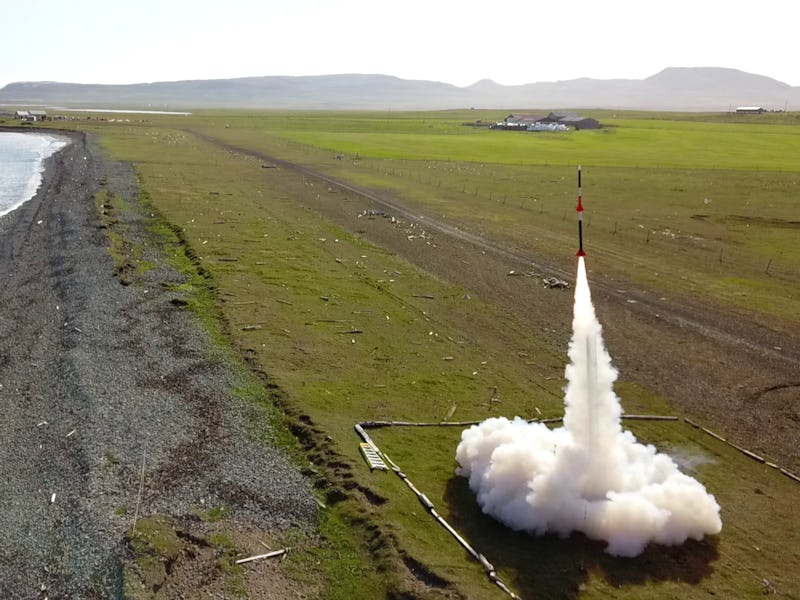Skyrora: The new rocket company bringing balance to the modern space race
Skyrora wants to bring space exploration to the masses.

On August 18 2020, a small rocket launched off the coast of Iceland.
The blast-off was the culmination of a years-long ambition for Skyrora, a rocketry firm based out of Edinburgh, Scotland. Out over the icy waters, they successfully tested their Skylark Micro rocket on a flight that traveled some 17 miles up into Earth's atmosphere.
It was a notable accomplishment for the United Kingdom's burgeoning private space industry, but what really stands out about this launch was where it happened: off the coast of Langanes, a narrow peninsula known for its goose-like shape and scenic beauty. Skyora had successfully set up a portable launch site from scratch in just five days.
Inverse talked to the company’s head of launch, Robin Hague, about the test and what it means for Skyrora's future.
What is Skyrora?
Founded in 2018, the company's "total focus is small satellites,” Hague says.
The craft have a maximum weight of 661 pounds (300 kilograms). The company wants to be involved with all variety of small satellites: telecommunications, tiny CubeSats, weather information.
“All of it,” Hague affirms.
Right now, the company is focused on developing five classes of its Skylark family of rockets: the Skylark Micro, the SkyHy, the Skylark L, and, last but not least, the Skylark XL.
The Skylark Micro, which the company just successfully launched, is their second largest. The Skylark XL is the largest of the five: a three-stage rocket that the company hopes will have a range of over 620 miles (1,000 kilometers).
When it comes to the XL, Skyrora wants to stand out with the accuracy Hague says it can attain over its competition. The passengers in an XL launch won't be people, but rather satellites looking to form constellations for any number of reasons — security networks, telecommunications, or learning about farming conditions, to name but a few.
“We're using hydrogen peroxide as our oxidizer, which allows a catalytic ignition. So, basically to restart our third stage all we have to do is open the valves again. Open the valves, and it will relight," Hague explains.
"We will be able to provide passengers on a cluster launch with the ability to get closer to where they really want to be rather than just dumping everyone off in one spot."
The Skylark Micro, pre-launch in Iceland.
Skyrora's Mobile Launch Platform
As space exploration ramps up, spaceports, like NASA’s Cape Canaveral in Florida, are in high demand. There are only 23 active spaceports in the world, with the vast majority of them either in America or Asia. Several are used exclusively by governmental organization. Publicly available spaceports like Cape Canaveral, or Russia’s Baikonur Cosmodrome, originally built by the Soviet Union, have long wait-lists. And they're expensive.
That's why Skyrora holds so much promise as an equalizer for space companies. Their main innovation -- fully portable and cheap spaceports -- has a long history. Mobile launchers sent the Apollo rockets to the Moon. And big players in the industry, like SpaceX, are planning on adding mobility to their launch sites soon. What makes Skyrora different is the company's continued progress without much of a space industry surrounding its employees.
Hague prefers the term “portable” to “mobile,” saying that Skyrora is “not looking to turn up with a complete system and launch and then go away again.”
Rather, the company is creating portable systems that can launch smaller rockets from a variety of areas.
The company hopes to one day establish a UK-based vertical launch site, too. In June, the UK Space Agency put forward a plan to build a spaceport in the Scottish Highlands, and on August 20th, the Highland Council approved plans for a spaceport on the A’ Mhòine peninsula.
What’s the space industry like in the UK?
Skyrora's success represents what could be a new era of British-led space innovation.
“People are often surprised by the idea that such activity should be happening in the UK, but in the last couple of years we are getting to the point where it is more well known,” Hague says.
Unlike America or Russia, the UK does not have a long history of spaceflight. The UK has launched a satellite of its own on a rocket once. And the nation's first astronaut, Helen Sharman, was sent to the Mir space station in 1991. The first Scottish astronaut, Dave Mackay, flew on Virgin Galactic’s SpaceShipTwo as a test in 2011 ( Virgin Galactic’s definition of “outer space” is up for debate).
“We are much getting better recognition” thanks to the coming Scottish spaceport, Hague says, noting “tremendous enthusiasm for it.” But there have also been local protests on environmental grounds.
A close-up of the Skyrora Micro's recent launch in Iceland.
What’s next for Skyrora?
With a successful Skylark Micro launch, the company will move ahead with launching the Skylark XL. The plan is to keep going with progressively larger vehicles.
“Our big step, that we expect to come up in the early part of next year, would be being able to launch our single-stage, bioliquid vehicle, the first thing to be flying with our in-house propulsion,” Hague says.
The company hopes to launch Skylark XL into orbit by 2023. Watch these skies.
The Inverse Analysis — Skyrora is making headway in a region without much existing space industry to support it. The company's goals are small and focused, and they are hoping for government intervention favorable to building up a domestic space industry. In the meantime, the company's portable spaceports are a promising innovation for all those interested in space exploration.
This article was originally published on